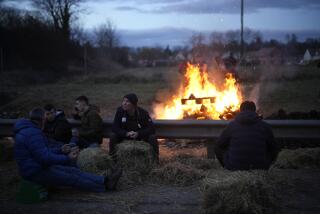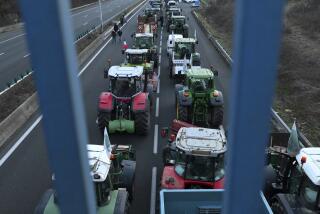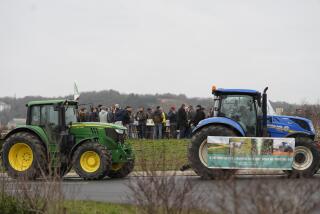A War Mentality Takes Hold in French-British Beef Battle
- Share via
LONDON — Britain and France, two ancient European nations that love to hate each other, have done battle over the centuries with longbows, lances and flintlocks.
Now the prickly neighbors are waging war with xenophobic insults, cross-Channel “blockades” and boycotts of their favorite foods.
The cause of this unofficial trade war is British beef. More accurately, it is the French refusal to buy British beef even though the European Commission has declared the meat free of “mad cow” disease and safe to eat.
Some outraged British shopkeepers and supermarket chains have retaliated by banishing chablis, brie and other French delicacies from Anglo shelves. The British media have fueled the furor, and the Tory opposition has taken up the food fight in its anti-Europe campaign.
French farmers, in turn, set up a symbolic barricade of the Channel Tunnel terminal in Calais this week, and Le Figaro newspaper in Paris accused the British of surrendering to “collective hysteria.”
On Thursday, British farmers fired up a barbecue across the street from the French Embassy in London, handing out roast beef sandwiches to passersby and sending up a plate of boeuf anglais to the ambassador, who reportedly sampled the gift with diplomatic gusto.
“There’s nothing wrong with French beef, but British beef just has that je ne sais quoi,” said Devon farmer John James.
For the French, the issue is one of health and food safety. The French government unilaterally banned imports of British beef Oct. 1 and heaved a 600-page scientific report on the table at the European Union’s executive headquarters in Brussels, asserting that British beef could still be tainted by bovine spongiform encephalopathy, or “mad cow” disease, the original reason behind the EU’s 1996 ban on British beef that was lifted in July.
A 16-member EU scientific panel opened a two-day meeting in Brussels on Thursday to determine if there is any substance to the French allegations. A majority of the scientists have indicated that they don’t believe the French have a case. Their findings could trigger EU legal action against France.
Also undermining France’s militant stance in the eyes of many meat eaters is the recent revelation that French agribusiness has long used treated sewage, including human waste, to enrich animal feed.
French authorities say the practice was detected and stopped a year ago, but the news has ignited indignation among Britons over what they perceive as gallic hypocrisy in matters of food hygiene.
“Now, our Daisy may have had a few problems forgetting people’s names, mistaking herself for a chicken, that kind of thing, but she never stooped to eating human feces,” Guardian newspaper columnist Charlotte Raven wrote in one of the more tongue-in-cheek commentaries on the flare-up.
The British tabloids, however, have found little humor in the battle. They say this is a case of French protectionism and further proof that Europe is not to be trusted.
The Sun tabloid published its front-page editorial under the headline “We don’t want WAR but France is wrong.” And in case their neighbors did not get the message, they published a second front page in French: “Nous ne voulons pas la GUERRE mais la France a tort.”
Despite Britons’ assertions that their beef is suitable for human consumption, French polls show that the government in Paris has massive public support for its action. A survey published in Sunday’s Ouest-France newspaper in the city of Rennes showed that 68% of respondents were opposed to lifting the embargo.
Even representatives of Britain’s beef farmers and packers admit that, were they allowed to ship their products to France tomorrow, few consumers there would buy them.
French farmers, meanwhile, have served notice that they will take action if British supermarkets and restaurants continue to boycott French foods. On Tuesday, about 50 farmers stopped a few British trucks at the French end of the Chunnel and inspected their cargo.
Luc Guyau, president of the largest union of French farmers, has said that British producers and consumers would be the losers if there were a full-fledged trade war.
“England is an island,” Guyau warned. “An island is easier to blockade than a continent.”
The French, who swear by the motto “You are what you eat,” have never had much regard for British cuisine. They made that clear again when examining a load of frozen slabs of chicken--British food aid bound for Moscow.
“I am scandalized that they can give this to people,” said Jean-Bernard Bayard, another farm leader.
Rhetoric aside, French farmers and food processors are worried because the British boycott has begun to bite. Apple exports reportedly are off 20%, and one French cheese maker reported a 20% to 30% drop in sales.
British Prime Minister Tony Blair has resisted Conservative Party calls for a full-fledged boycott of French products, saying such a trade war would be illegal and would damage both sides.
Britain has the moral and legal high ground, Blair said, and will demand EU action against France if the European scientists dismiss France’s scientific report.
If the French ban is declared groundless, it will fall to the European Commission to take France to the European Court of Justice in Luxembourg for its intransigence.
Conservative Party leader William Hague, a so-called Euroskeptic who fears that Britain is giving up too much power to EU headquarters in Brussels, called for a boycott of sewage-fed livestock products from France and labeled Blair a wimp.
“When it comes to this government, it is not just the dead cows which have had their spines taken out,” Hague said to the prime minister during a session in Parliament.
While the British bicker, the French seem to be looking for a face-saving way out. Agriculture Minister Jean Glavany said his government will change its position only if its scientists do. But he also floated the germ of a compromise: that France would be ready to lift the ban on British beef in exchange for more rigorous sanitary checks.
“Between the extremes of a general return to the European embargo against British beef and European Commission punitive action against France,” Glavany said, “there are possibilities for compromise.”
*
Miller reported from London and Dahlburg from Paris.
More to Read
Sign up for Essential California
The most important California stories and recommendations in your inbox every morning.
You may occasionally receive promotional content from the Los Angeles Times.










